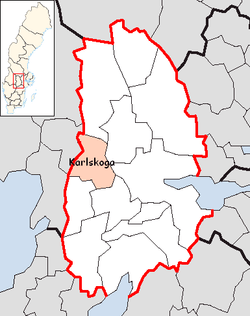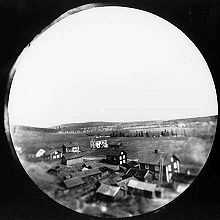Karlskoga Municipality
| Karlskoga kommun | ||
|---|---|---|
| Municipality | ||
| ||
 | ||
| Country | Sweden | |
| County | Örebro County | |
| Seat | Karlskoga | |
| Area[1] | ||
| • Total | 510.38 km2 (197.06 sq mi) | |
| • Land | 468.23 km2 (180.78 sq mi) | |
| • Water | 42.15 km2 (16.27 sq mi) | |
| Area as of January 1, 2014. | ||
| Population (December 31, 2014)[2] | ||
| • Total | 30,054 | |
| • Density | 59/km2 (150/sq mi) | |
| Time zone | CET (UTC+1) | |
| • Summer (DST) | CEST (UTC+2) | |
| ISO 3166 code | SE | |
| Province | Värmland and Närke | |
| Municipal code | 1883 | |
| Website | www.karlskoga.se | |
| Density is calculated using land area only. | ||
Karlskoga Municipality (Karlskoga kommun) is a municipality in Örebro County in central Sweden. Its seat is located in the city of Karlskoga.
Karlskoga was formed as rural municipality when the first Swedish local government acts came into force in 1863. In 1925 the southern part was detached, forming Degerfors Municipality. In 1940 the whole municipality, including its non-urban areas, got the title of a city. These titles were abolished in 1971.
Geography
Karlskoga is part of a traditionally forest and mountain covered region, in Örebro County.
Such areas have traditionally been financially poor. This led to a significant Swedish emigration to North America from the district in the latter half of the 19th century. Stockholm, Wisconsin was for instance founded in 1854 by immigrants from Karlskoga.
History

For centuries, Karlskoga was a small forest and mining community, not a parish of its own. The parish was established in 1586 and a wooden church was built. In the 17th century fourteen small iron works and eight waterdriven hammers for bar iron were established. Most of these were still operating in the 1860s, but the dominating iron works was the one in nearby Bofors. In 1871, Bofors produced 6,124 metric tons of iron, more than any other plant in Sweden. In 1882, Karlskoga parish/municipality (socken) had 11,184 inhabitants.
Industry
Bofors was incorporated in 1873 and has since the 1880s been specializing in the lucrative manufacture of cannon. Karlskoga has spent most of the 20th century as a growing company town to this cannon manufacturer. Only with the demilitarization in the most recent decades has this started to be a problem for the town. There were 8,500 workers in Bofors in 1980, but the number had decreased to 2,600 in 1998.
Sports
The ice hockey team Bofors IK has for a long time been the most prominent sports team of the municipality. There is also a football team called KB Karlskoga Fotboll.
International relations
Twin towns — Sister cities
Karlskoga is twinned with:
|
See also
- Karlskoga Mountain District
Notes
- ↑ "Statistiska centralbyrån, Kommunarealer den 1 januari 2014" (MICROSOFT EXCEL) (in Swedish). Statistics Sweden. Retrieved 2014-04-18.
- ↑ "Folkmängd i riket, län och kommuner 31 december 2014" (in Swedish). Statistics Sweden. Retrieved March 2015.
- ↑ Skoog, A. Ingemar (2009-07-17). The Alfred Nobel rocket camera. An early aerial photography attempt. Acta Astronautica (Elsevier Ltd). doi:10.1016/j.actaastro.2009.06.011.
External links
| Wikimedia Commons has media related to Karlskoga. |
- Karlskoga Municipality - Official site
- Bofors
- Nobel Museum
| |||||||||||||||||
| ||||||
